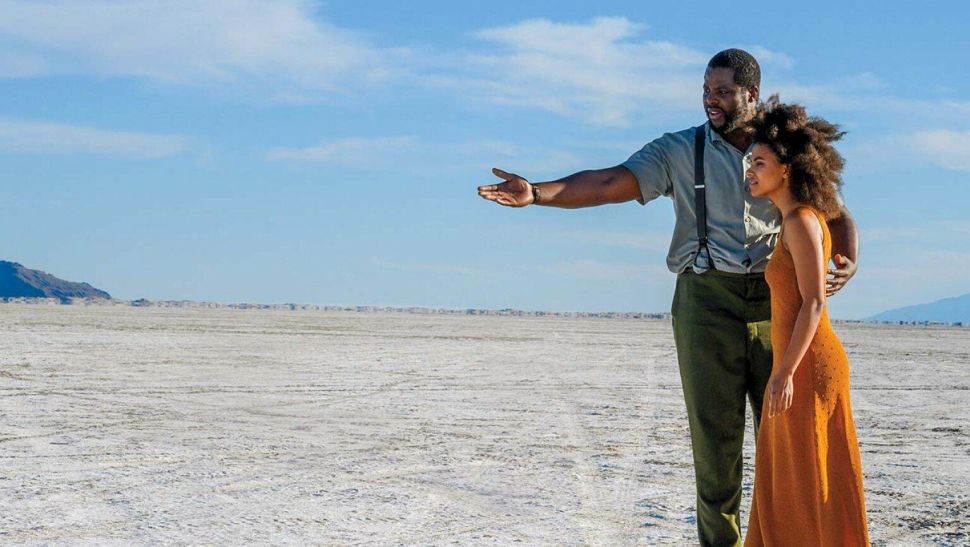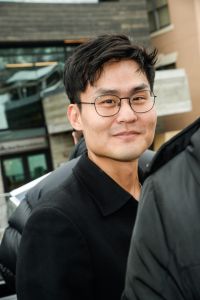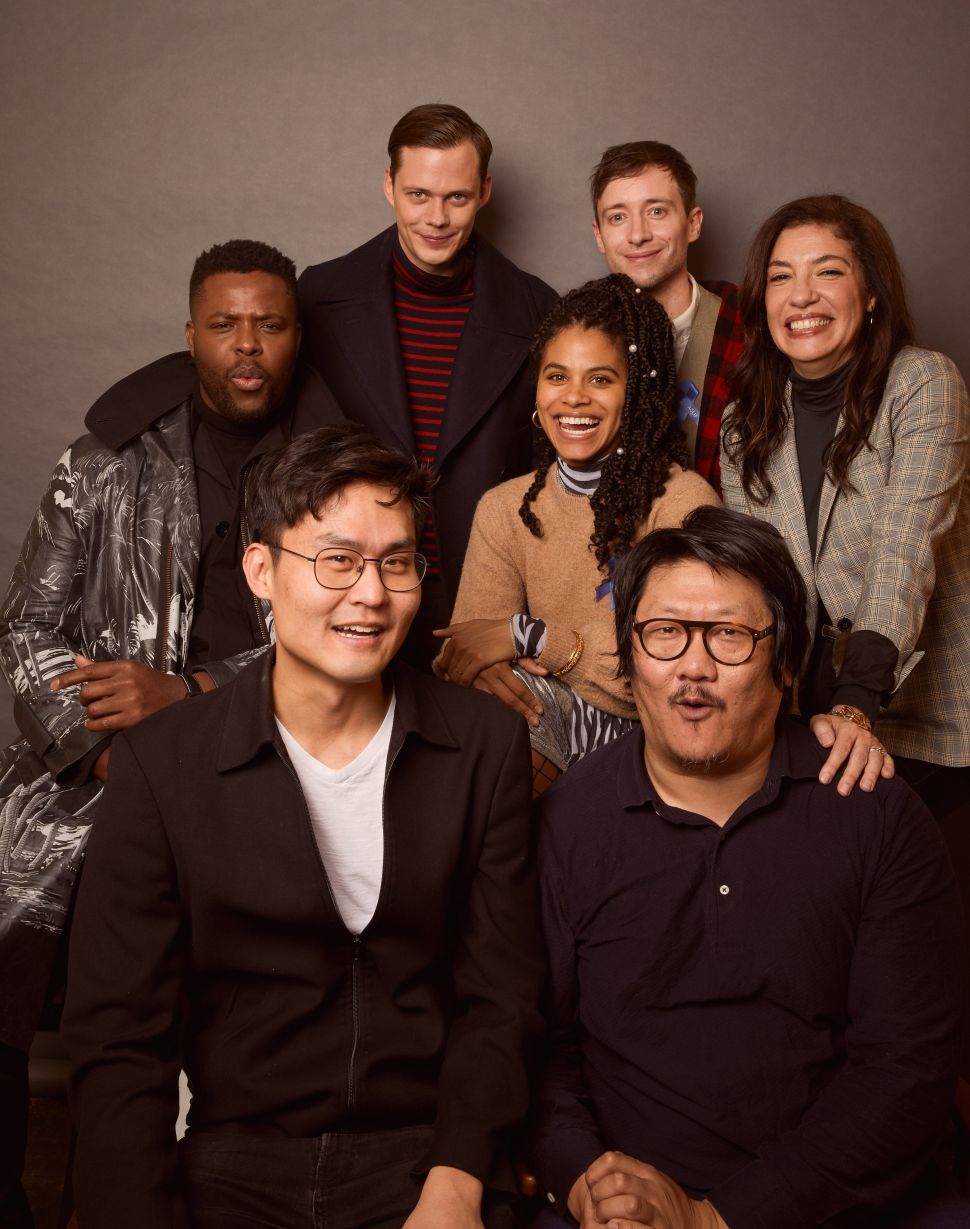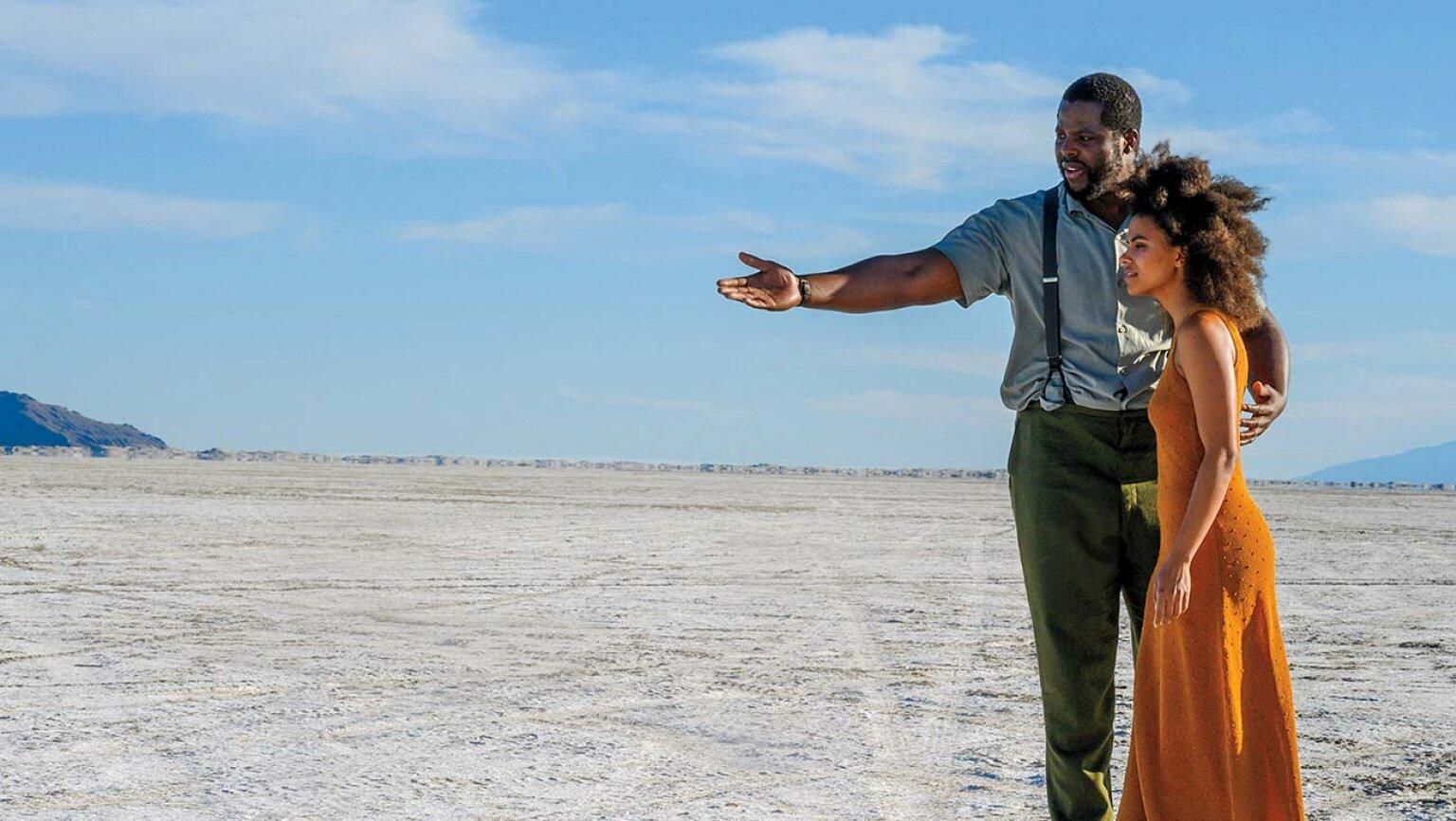
What is a human soul before conception? Where do we exist before we become us? What are the colors of this world with no name as it sits in its own plane of existence? What does forgiveness of our mistakes and regrets of our past look, sound and feel like, are just some of the questions asked and possibly answered in Nine Days, the debut feature film written and directed by Japanese Brazilian filmmaker Edson Oda.
Taking place over the course of the nine days, the film spends time with Will (Winston Duke), an interviewer whose job is to determine which souls are worthy of life and which won’t exit once the nine days have passed. In his isolated outpost located in a vast open plane of a world with no name, Will suddenly finds himself struggling to process the loss of one of his people. Unable to understand what happened, he’s caught between his own feelings of confusion, fear and disappointment, and those of the new souls who appear for evaluation in order to live in the place of the departed.
I just stepped back a little bit, and I told my cinematographer to just follow her movements, whatever they do.
Haunted by past mistakes and his own insecurities, Will is determined to make sure that every choice he makes is the right one, and lives his life in a carefully controlled manner in everything from the way he speaks, moves and thinks. But this is disrupted when Emma (Zazie Beetz), one of the new unborn souls, along with Kyo (Benedict Wong) his friend and supervisor, challenge and encourage Will to think about life, loss and forgiveness in ways he never considered.
Featuring a racially diverse cast, Nine Days is an emotionally evocative film that approaches the idea of death, time and what we would do to cherish the moments we have before leaving in a wonderfully touching manner.
During a recent Zoom interview with Oda, Observer spoke with the filmmaker about the way he explores the concept of life before death, observing the people in our lives and bringing art to life.
Observer: To me Nine Days is kind of like a surrealistic, high concept film, and of the way you’re discussing life and death, and even the concept of the “in between,†what some people would call purgatory. But I don’t think it’s necessarily permanent. Because it isn’t that the people have died and they’re stuck there, I think “the before†is the before birth and even before conception. As such I wanted to know about the conception of Nine Days, because I think this is a very interesting way to discuss what the meaning of life is as we say.
Edson Oda: There’s so many movies about the afterlife, right? And it’s interesting, because somehow I think I’m obsessed about death as though it’s something that I think all of us need to face. But it’s kind of, you know, we don’t want to [face it]. For example Defend Your Life or you know, After Life by Koreada and all these movies….
But at the time, we didn’t have anything [about] before life, so I thought it would be also a good opportunity in the sense of — when after life [is] so much about the goal, the destination, anything before life is something about you seeing yourself as like a winner, you know? Of this race? Like okay, there’s something before, and you’re here for some kind of reason, or you’ve won some kind of condition, whatever, but you’re here, and now you have the chance to enjoy [it]. So I think it came from that place.
With regards to Kyo and Will — who I think are fantastic casting — they’re the antithesis of each other, where Will is just counting down the days he has for the interviews because for him time is just the nine days, after which everything just resets, whereas to Kyo is fascinated with observing Will, and time itself. He likes to watch the stars and wonders about people in parallel universes. What was your inspiration for the two of them and creating their dialogues?Â
Will was based on an uncle of mine, who was just a very kind, very sensitive person. I barely met him to be honest, and he was 50 at the time when he committed suicide. He took his own life and it was interesting because I remember seeing him [as a] distant figure like this… Someone I know who wasn’t strong enough to survive the world, and I think I felt like that’s true like [for me] so many years. And then after it, I was just going through my struggles and you know, feeling more or less I think what he felt as well. That’s when it started. Just wanting to know more about him and wanting to know more about our connection you know? Because I see a lot of him inside me, and probably a lot that’s inside me probably was inside him as well.
So, somehow we got closure, through the process and it’s kind of me being afraid of becoming my uncle is all [of] this together. So it’s…almost a cathartic process as I was writing him. And I think Kyo is so much about the perspective, right? While we’re so much about the blind spots, I think when there are moments in your life [when], you can’t see what’s in front of you, or you just see what’s what’s really causing you pain, or struggle, and I think it’s hard for you to just observe anything else. And Kyo has a bit broader view and he is able to just see things and not just [the] blind spots. He has I think a broader view than Will. That’s why sometimes he almost becomes like his conscience, at times. So yeah, I think this comes from this dynamic of Will and Kyo comes from that, I guess.


I find each of these characters so compelling, and for me, Will kind of represents — for any of us who’ve lost people in our lives — when we always think of “What did we miss?†“Where was the clue?†And for Will it’s fascinating because he has these multiple TV screens, and he’s watching dozens of people live their lives from the beginning, but he gets so caught up in Amanda’s death because she was the one person that only ever remembered him after she was born. I saw that as…sometimes if there’s one person that we connect with throughout life, and then suddenly lose them, we’re just left trying to figure out what happened. He has all of this time watching them, but he still can’t see everything.Â
Sometimes we misinterpret things, or people are so good at hiding pain, especially those who have depression or are functional depressives. They’re very good at hiding their pain, or even if they do let it out, we miss the cues.Â
For the concept of the multiple screens, I think it’s fascinating that you have this one person who’s watching all of these people, people will say like the “God’s Eye.†I don’t think it’s that. I think it’s just representative of everyday people like me and you who have all of the people in our lives and we’re just watching and observing them.
Yeah, no, that’s so smart. You know, I think your interpretation, especially for saying that Will is not — because some people feel like,“Oh, Will was God,†— but it’s interesting to say he’s everything but God. He’s powerless. You know, it’s interesting, because God, you feel like he has power and control over things, and Will doesn’t. So that makes him the most distant being from God in some sort of way. But I think then he sees it, what power he has.
But, yeah, it’s interesting because the idea of the TVs was more functional than anything else was. I just needed to create something that makes it possible for Will to keep the connection with the people he sent [away]. Maybe they send a letter, or maybe there was someone who films, and none of those things made sense because it felt like there’s something that should be more like, you know, visceral, almost spiritual in some sort of ways, but at same time, not out of the blue. It didn’t have to follow some kind of rule.
What if the person sees through their eyes, and then he can see what they’re doing? So I think the TVs came from that necessity.
In your short films it seems that you use people and different mediums to take stories literally outside of one medium, and present them in another form, like you use books or pictures, or even pens and just bring them up. And you do it in Nine Days as well with the beach scene, which made me cry. Tell me a bit about your fascination with what I think is projecting life from one medium to another.
I love exploring. I love playing with mediums, you know? I feel that we haven’t explored all the resources of cinema somehow. People will fill the gaps [of] two images together combined. They will complete the meaning of, “Okay, one person is there, another person there, you cut over the shoulders, and it makes sense.†But life is not like that. And I think there’s something about cinema which I love is just exploring stuff in the language that we can figure things out, and show in a way that we haven’t seen before.
So, always trying to just explore and trying to find new ways to tell a story. It’s always a lot of fun when you’re [in the] editing room and you combine things that basically wouldn’t make sense together, but when you see it, it’s just like “Oh, yeah, now it makes sense.†So it’s, as you can see in most of my short films, they’re like that. I think that comes from my curiosity and exploration, you know.


One of the most endearing qualities of Will as a character is his conscientiousness. With the souls who will never have a chance to be conceived, he creates gifts. Moments crafted especially for each individual whose existence will never go beyond their nine days. With the help of Kyo and Emma he carefully designs treasures made from trash, bringing to mind the old adage of “One man’s trash is another man’s treasure.â€
These scenes are some of the most beautiful in the entire film because they evoke all the longing, wonder and appreciation the characters had, and we should have for the wonderful moments in our lives. From a technical aspect they serve as some of the most unique set pieces in the film, creating atmospheres different to any other seen or heard because they involved the construction of an actual mini beach, and scenic bike ride through the streets and passageways of Brazil.Â
I think the production design is super interesting, because it’s very minimalist, but there are parts that do come to life and are very impactful for the overall story, so can you speak a bit about your production design, working with the crew and your set designer?
He was great, my production designer. His name is Dan Emerson, and it was just amazing how he elevated, you know, the work and those scenes, because the way I wrote it, it was more about the scenes. It was very minimal, like the rest of the movie. And I think what Dan brought to the scenes is more like “I think this is a moment and we can just expand,†you know? Even the beach was almost like a sandbox or something, and then a person would just put their feet there, and it would be more about their reaction, rather than that becoming more than life, you know, experience. So I think like Dan and cinematographers, and set designers, they create an environment that was just…it’s, it’s so big without being that big. But it feels really big, what they did, because they create this you know depth to like very simple objects, but it feels huge somehow because the moment is huge.
Mostly we have the same idea. It was interesting, because when we were exploring we felt like “Oh, yeah, probably it should be more polished.†There’s screens, they’re a little you know, not perfect, and for me [it was], “No no, no, they need to be like that. Let’s just make it more amateur.†Like the scenes that were recorded on the beach, they were not 100% stable, and they said they should be the P.O.V. of someone watching this, but it’s not gonna look better. But I think in the end that like roughness, that kind of amateur quality makes it more magical because it’s something that anyone could just like, put those things together.
It’s almost like, you look at a play that elementary school kids do in school, and it’s so beautiful. It’s so magical because it comes from a very innocent, pure place and I think that those last wishes had to have the same quality to it.
Going back to the characters a bit, I think Emma (Zazie Beetz) and Kane (Bill Skarsgard) are similar to Kyo and Will. They’re essentially opposites of each other. I see Kane as being very pessimistic. When he watched these peoples’ worlds he saw the reality of what they were, and Emma, she was optimistic, and questioned why Kan couldn’t see the good the way she could, and he asked her the same about seeing the bad things for what they were the way he could.
For those two characters just tell me a bit about working with the actors and the actresses that you’ve got for this film, because I think everyone was perfectly cast as I can’t see anyone else playing their roles.
I think it started first with the souls, not just like Kane and Emma, not just as Zazie and Bill, but we sat together and we just determined what would be the rules, and what was the process of them becoming who they are. So it was interesting, because we would start…even for Kane or for Emma… they would kind of start the same, at the same place, from what they see, and the meaning they gave to them started getting different, you know.
Then they start showing their personalities. So what was evident about Kane was not that he was bad or good or anything pessimistic, but he was just mirroring what he was seeing [on] the TVs. And also I think we make choices in what we watch, it shows also our personality, so he was more drawn to the things of violence or of competitiveness and those types of things.
I think for Kane [it] was more like he was mirroring what he was seeing. I think he would agree, like, “Okay, so if the word is giving me that, I can give it back.†But I think from what he saw from the world [he thought] “I need to do different,†so it was more like a mirroring of the world, more than being pessimistic.
For Emma, it’s interesting because when I was talking to Zazie, for her [it] was so much about being in the moment, in the present and asking questions, but not focus on any kind of goal or anything. I can say Kane is almost projecting his desires in the future because he wants to be selected. He wants to adapt. He wants to survive. While Emma is not so much about the future, [but] is about the present.
It’s interesting because surviving involves a lot [of looking at] the future right? Which is why you have to plan to survive and to think about how you’re going to survive in like three years, four years or something. And Emma, since she doesn’t have so much of a strong sense of future, so much of a present, it’s kind of natural that she’s not going to be the best survivor, I guess.
I wanted to ask you about the final scene. It’s this amazing monologue and this recitation of a poem by Will. What was the process of directing that scene one with Winston? I imagined it could have been extremely emotional for him to film, and for you creating the dialogue also.
Yeah, it’s amazing because people say it’s a monologue, and I think was written as a monologue, but I really see it as a dialogue because even though Emma — Zazie doesn’t have the lines — so it’s just so much about how she responds in a way that she became part of it. I think that was the scene, ironically, that I directed the least. My main note was just to build it up, like, you know, “Start from here, and then go there. And don’t touch each other.†This is performing, so you can make art of it.
For that I just stepped back a little bit, and I told my cinematographer to just follow her movements, whatever they do. Winston would start and then from what Zazie was giving to him, he would just start doing something, you know, responding to that. And then from what Winston would give to her, Zazie would start doing something different. So it was this amazing game that both of them were playing, completing each other. And it was just, it was interesting, because I was able to just step back. It was more about letting them do their thing, and they did great.
I think my favorite line actually is more when they yelled together. It’s just like a yell and the sun comes, almost like this third character. Initially it’s interesting because when I was writing, the sun represented Amanda somehow, this violin, so it’s kind of almost like a conversation with three people there. I appreciate you sharing your thoughts on that scene. I really love that.
This interview has been edited for length and clarity.

